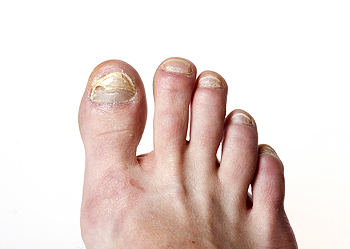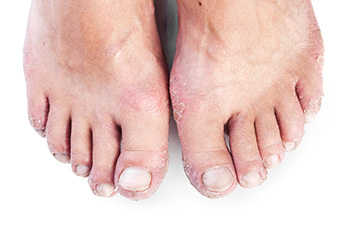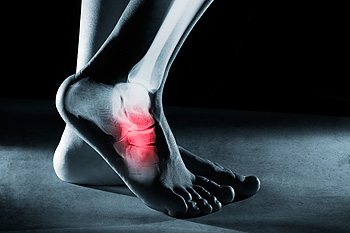






Toenail fungus, or onychomycosis, affects up to 14 percent of the population, with a higher incidence in toenails. Symptoms include discoloration, thickening, brittleness, and nail distortion. Advanced cases of toenail fungus may involve nail detachment, causing pain and potential infections. Fungal nail infections result from exposure to environmental fungi, exploiting small cracks in nails or surrounding skin. Risk factors include nail injuries, foot deformities, and trauma, creating entry points for fungi. Diabetes increases susceptibility due to compromised circulation and weakened immunity. Cancer or conditions suppressing the immune system elevate vulnerability. Poor leg circulation, such as venous insufficiency, or narrowed arteries, signaling peripheral artery disease, can contribute to the susceptibility for fungal nail infections. Those with a history of fungal skin infections are also more prone, especially anyone with a weakened immune system. Secondary bacterial infections are common in people with diabetes, amplifying health risks. Understanding toenail fungus causes and symptoms is essential for early detection. If you believe you have developed a toenail fungus infection, it is suggested that you schedule an appointment with a podiatrist who has advanced measures that can help rid you of this stubborn condition.
For more information about treatment, contact one of our podiatrists of Active Foot and Ankle Care, LLC. Our doctors can provide the care you need to keep you pain-free and on your feet.
Toenail Fungus Treatment
Toenail fungus is a condition that affects many people and can be especially hard to get rid of. Fortunately, there are several methods to go about treating and avoiding it.
Antifungals & Deterrence
Oral antifungal medicine has been shown to be effective in many cases. It is important to consult with a podiatrist to determine the proper regiment for you, or potentially explore other options.
Applying foot powder on the feet and shoes helps keep the feet free of moisture and sweat.
Sandals or open toed shoes – Wearing these will allow air movement and help keep feet dry. They also expose your feet to light, which fungus cannot tolerate. Socks with moisture wicking material also help as well.
If you have any questions please feel free to contact our offices located in Fair Lawn, Riverdale, and Englewood, NJ . We offer the newest diagnostic tools and technology to treat your foot and ankle needs.

Psoriasis is a visible autoimmune disease characterized by red patches of skin with silvery scales. It results from an overactive immune system, attacking healthy tissue and causing excess skin cell production. However, this immune response can also trigger inflammation in joints. Approximately one-third of psoriasis patients develop psoriatic arthritis, or PsA, a chronic inflammatory joint disease. Often, psoriasis precedes PsA, but joint issues can emerge before skin symptoms, or may be so mild that patients do not connect them with psoriasis. Psoriatic arthritis can affect any joint, including the ankles and tendons around them. Symptoms include pain, tenderness, swelling, and warmth in the joints. Foot-related problems from PsA can include swelling of entire toes, heel pain from Achilles' tendon inflammation, and sole pain due to plantar fascia inflammation. Additionally, it can cause nail changes such as lifting, pitting, discoloration, or thickening. Managing PsA involves symptom control and joint protection. If you have psoriatic arthritis and it is impacting the comfort of your feet or ankles, it is suggested that you schedule an appointment with a podiatrist for a correct diagnosis and treatment options.
Arthritis can be a difficult condition to live with. If you are seeking treatment, contact one of our podiatrists from Active Foot and Ankle Care, LLC. Our doctors can provide the care you need to keep you pain-free and on your feet.
Arthritic Foot Care
Arthritis is a joint disorder that involves the inflammation of different joints in your body, such as those in your feet. Arthritis is often caused by a degenerative joint disease and causes mild to severe pain in all affected areas. In addition to this, swelling and stiffness in the affected joints can also be a common symptom of arthritis.
In many cases, wearing ill-fitting shoes can worsen the effects and pain of arthritis. Wearing shoes that have a lower heel and extra room can help your feet feel more comfortable. In cases of rheumatoid arthritis, the arch in your foot may become problematic. Buying shoes with proper arch support that contour to your feet can help immensely.
Alleviating Arthritic Pain
It is best to see your doctor for the treatment that is right for your needs and symptoms. Conditions vary, and a podiatrist can help you determine the right method of care for your feet.
If you have any questions, please feel free to contact our offices located in Fair Lawn, Riverdale, and Englewood, NJ . We offer the newest diagnostic tools and technology to treat your foot and ankle needs.

Foot stress fractures, tiny cracks in the bones, can emerge from a myriad of factors that subject the feet to repetitive stress and strain. One primary cause is overuse, where excessive or sudden increases in physical activity like running or prolonged standing surpass the bones' capacity for repair. Wearing inadequate footwear or worn-out shoes lacking proper support amplifies the risk, as they fail to absorb shock adequately. Biomechanical factors, like abnormal foot structure or gait patterns, contribute to uneven weight distribution, placing specific areas under heightened stress. Insufficient conditioning and muscle fatigue diminish the ability of muscles to absorb impact, transferring excess force to the bones. Additionally, nutritional deficiencies, particularly in calcium and vitamin D, compromise bone strength, elevating the susceptibility to stress fractures. By wearing proper footwear, adopting a gradual training progression, and supplying nutritional support, individuals can fortify their foot health and reduce the likelihood of encountering the discomfort associated with stress fractures. If you have developed a foot stress fracture, it is suggested that you are under the care of a podiatrist who can offer you the treatment option that is right for you.
Activities where too much pressure is put on the feet can cause stress fractures. To learn more, contact one of our podiatrists from Active Foot and Ankle Care, LLC. Our doctors can provide the care you need to keep your pain free and on your feet.
Dealing with Stress Fractures of the Foot and Ankle
Stress fractures occur in the foot and ankle when muscles in these areas weaken from too much or too little use. The feet and ankles then lose support when walking or running from the impact of the ground. Since there is no protection, the bones receive the full impact of each step. Stress on the feet can cause cracks to form in the bones, thus creating stress fractures.
What Are Stress Fractures?
Stress fractures occur frequently in individuals whose daily activities cause great impact on the feet and ankles. Stress factors are most common among:
Symptoms
Pain from the fractures occur in the area of the fractures and can be constant or intermittent. It will often cause sharp or dull pain with swelling and tenderness. Engaging in any kind of activity which involves high impact will aggravate pain.
If you have any questions please feel free to contact our offices located in Fair Lawn, Riverdale, and Englewood, NJ . We offer the newest diagnostic and treatment technologies for all your foot and ankle needs.

Podiatrists conduct thorough evaluations of feet to optimize exercise outcomes and prevent injuries. This process begins with a detailed assessment of the foot's structure, which includes examining the arch, toe alignment, and overall foot shape. This type of doctor pays close attention to any abnormalities or conditions like flat feet, high arches, or bunions that may impact exercise performance or lead to injury. Gait analysis is another critical aspect, where the podiatrist observes how a person walks and runs. This analysis helps identify any irregularities in foot movement that could cause problems during physical activities. A key part of the evaluation is understanding the individual's exercise routine, including the type of activities they engage in, and the frequency and intensity of these activities. This information, combined with the physical examination, enables the podiatrist to make personalized recommendations. These may include specific types of footwear, custom orthotics, or exercises to strengthen the foot and ankle. If you are exercising or embarking on a new exercise program, it is suggested that you make an appointment with a podiatrist for advice to enhance your comfort, improve performance, and reduce the risk of foot-related injuries during exercise.
Exercising your feet regularly with the proper foot wear is a great way to prevent injuries and build strength. If you have any concerns about your feet, contact one of our podiatrists from Active Foot and Ankle Care, LLC. Our doctors can provide the care you need to keep you pain-free and on your feet.
Exercise for Your Feet
Exercise for your feet can help you gain strength, mobility and flexibility in your feet. They say that strengthening your feet can be just as rewarding as strengthening another part of the body. Your feet are very important, and we often forget about them in our daily tasks. But it is because of our feet that are we able to get going and do what we need to. For those of us fortunate enough to not have any foot problems, it is an important gesture to take care of them to ensure good health in the long run.
Some foot health exercises can include ankle pumps, tip-toeing, toe rises, lifting off the floor doing reps and sets, and flexing the toes. It is best to speak with Our doctors to determine an appropriate regimen for your needs. Everyone’s needs and bodies are different, and the activities required to maintain strength in the feet vary from individual to individual.
Once you get into a routine of doing regular exercise, you may notice a difference in your feet and how strong they may become.
If you have any questions please feel free to contact our offices located in Fair Lawn, Riverdale, and Englewood, NJ . We offer the newest diagnostic and treatment technologies for all your foot and ankle needs.






